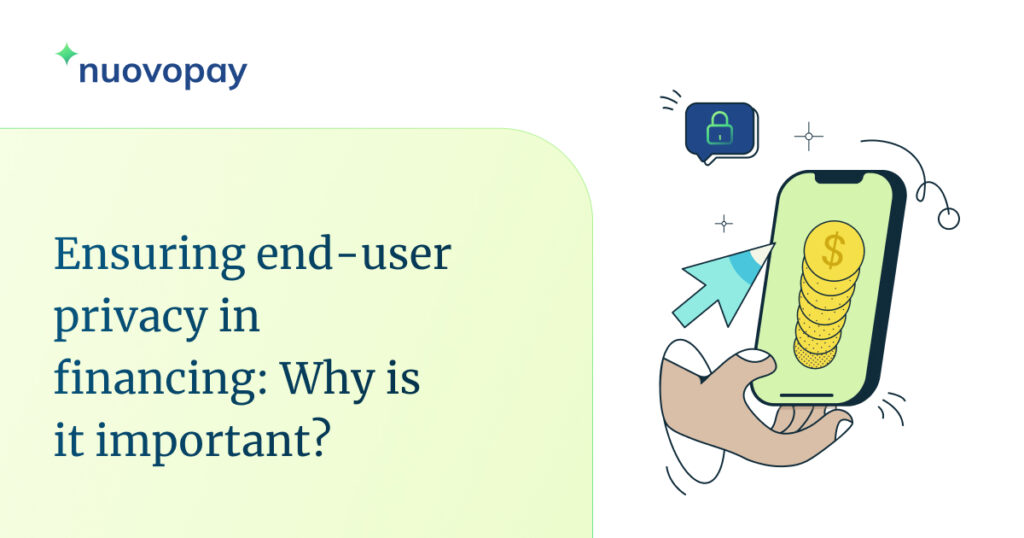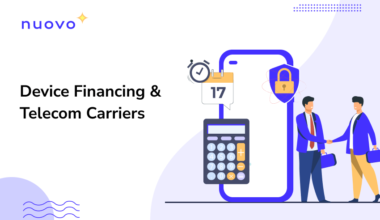Any modern financial system or function relies heavily on data and information. The integration of technology into financial services has brought about unprecedented convenience and efficiency. However, it has also introduced significant challenges, particularly in ensuring the privacy and security of end-user data.

In the world of lending and financing, financiers often retain some control over the assets lent to end-users until complete payment is made. This is done to prevent the risk of payment defaults. In such cases, it is paramount that financiers maintain and respect the privacy of the personal information or end-user-related data associated with the asset. For example, in smartphone financing, a lender might retain the right to lock or disable the smartphone remotely if the borrower fails to make payments. In doing so, the financier must ensure that any personal data on the device, such as contact lists, messages, photos, and app data, remains secure and private, preventing unauthorized access.
What does end-user privacy mean in financing?
An end-user is a person or entity that consumes or makes use of the goods and services financed by businesses. In the above example, the borrower is the end-user of the financed smartphone. Ensuring end-users privacy primarily means that they should have control over and give permission for what personal information is shared and accessed. Financers need to be transparent about their data practices and provide clear options for users to manage their own information and devices. Any necessary data collected or access retained over financed assets should be clearly communicated and permitted by the end users.
Why is end-user privacy important?
1. Building trust
When customers have control and choice over the data shared with financial entities, it significantly enhances their trust in these institutions. Knowing that their personal information is handled securely and with permission, customers feel more assured and confident in their interactions. By building trust through robust privacy practices, financiers can assure end-users that they are reliable partners in safeguarding personal data and fostering long-term relationships built on transparency.
2. Sensitive nature of financial data
Information related to payments and finances is often sensitive and extremely private in nature. End-users need to be actively aware and in control of this data being shared with other entities. They should be assured that only the information and access necessary for identity verification and completing their mutual transactions are granted to financiers. Maintaining the privacy of financial data empowers end-users to confidently perform financial activities. It protects their identity, assets, and overall financial well-being.
3. Compliance with security guidelines
Ensuring end-user privacy is crucial for financing entities to comply with global security guidelines and regulations. Adhering to industry standards and regulatory requirements secures them from the risk of costly penalties and legal consequences. Global guidelines such as GDPR and other local regulations serve as frameworks for how financial institutions handle and protect personal data, promoting accountability. Their data privacy laws protect individuals’ information rights and ensure they have power over what personal information is shared.
Benefits of Prioritizing End-User Privacy
Consumers have become increasingly data-aware in the past years. They pay significant importance to privacy measures and policies when making financial decisions. Institutions that prioritize end-user privacy demonstrate their dedication to safeguarding user interests. This trust paves the way for enhanced digital inclusion. Individuals who were once wary of using financing services due to fears of privacy infringement can then be confident to opt for them, assured that their personal information is protected and respected. Ensuring privacy empowers end-users to make informed decisions and encourages them to participate freely in the economy.
Moreover, as companies prioritize end-user privacy, innovation in this space is driven to build finer privacy-centric solutions.
How NuovoPay ensures end-user privacy in Device financing
NuovoPay’s device financing risk management (DFRM) platform helps financiers safeguard against payment defaults on financed devices. It enables lenders to remotely lock financed devices in case of non-payment, ensuring asset security.
With a non-intrusive approach and minimal data collection, the platform prioritizes user consent, ensuring end-users have control over what financial information is shared and for what purpose. Personal data such as photos, messages, contacts, and app information remains protected, preventing any unauthorized access.
NuovoPay’s solution is compliant with global privacy standards and regulations, ensuring transparency in data practices. By combining asset protection with robust privacy measures, NuovoPay empowers financiers to safeguard their investments without breaching end-user trust.
Final Words
Ensuring end-user privacy is necessary to build trust, protect sensitive financial data, and adhere to global security standards. NuovoPay takes this responsibility seriously, offering a device financing risk management (DFRM) platform that enables financiers to secure financed devices without compromising user privacy.





